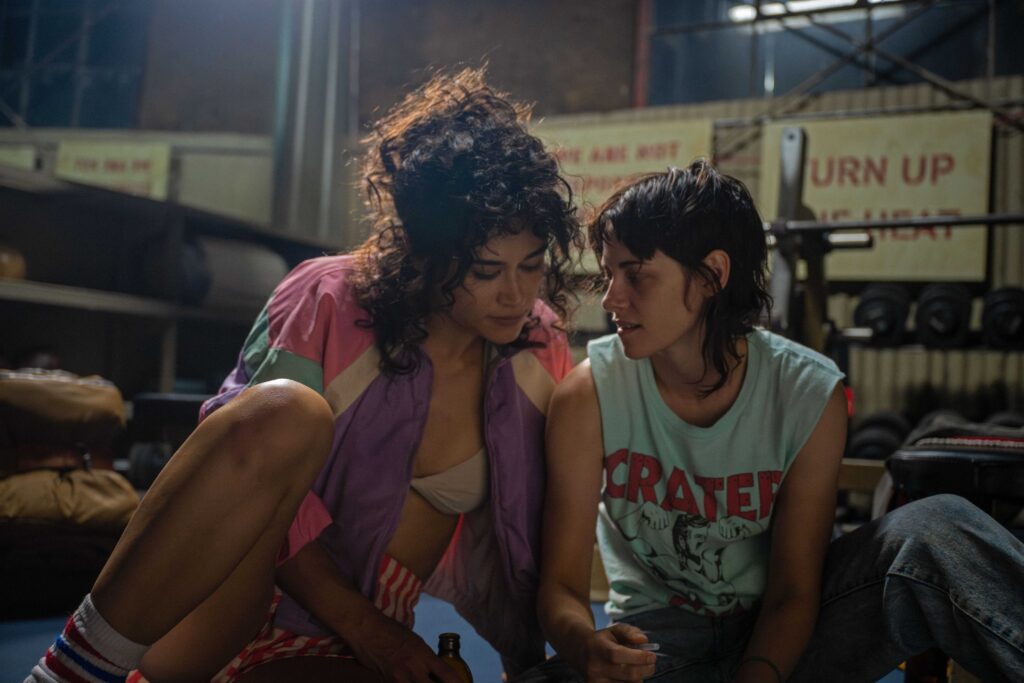
The MPA advisement for Love Lies Bleeding informs viewers that the film is rated R “for violence and grisly images, sexual content, nudity, language throughout, and drug use.” Setting aside that certain sickos (who me?) might perceive this notice as an inducement rather than a warning, one vice that the agency declines to mention is smoking—perhaps because the movie itself condemns such behavior. Early on, a woman named Lou pushes play on a portable cassette recorder (the year is 1989); as she half-listens to a health official drone on about the dangers of nicotine addiction, she aimlessly puffs on a cigarette. The obvious conflict between her brain and her body is amusing, even if her inability to quit quickly becomes the least of her problems.
Lou is played by Kristen Stewart, who supplies the kind of earthy, hard-bitten performance that has become the actor’s specialty post-superstardom. Stewart’s naturalism makes her an intriguing match with Rose Glass, the promising writer-director whose first feature, Saint Maud, was a raw nerve of a horror movie, observing a pious caretaker’s descent into madness with unsettling chops. In Love Lies Bleeding, Stewart’s effortless plausibility draws you inside Lou’s orbit and makes you root for her, even as Glass sets about upending her meager circumstances with exuberant chaos.
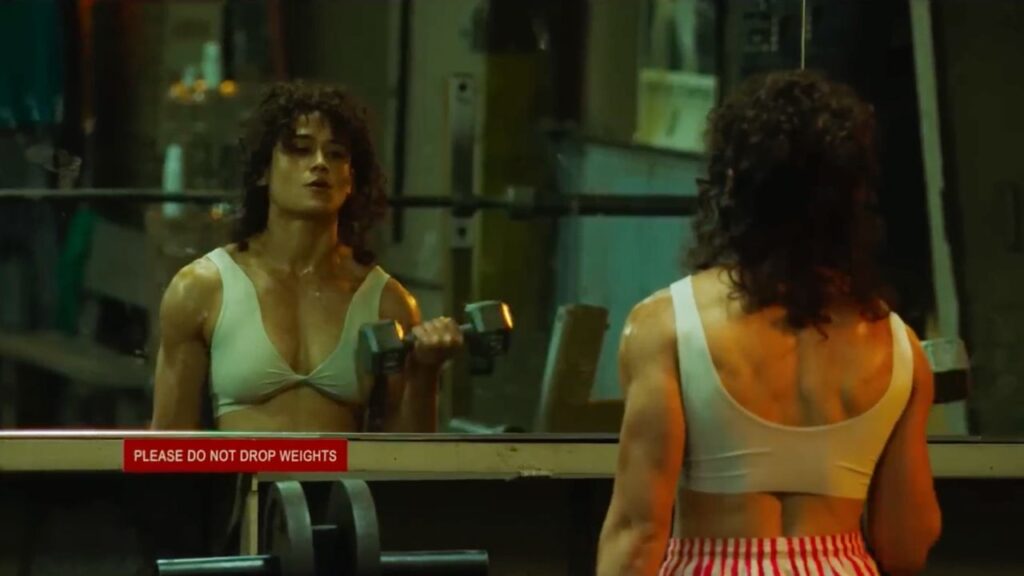
In one sense, Love Lies Bleeding is a grubby little neo-noir, in which hardscrabble characters find themselves ensnared in a complex plot that traffics in violence, duplicity, and the arduous disposal of corpses. (The Coen Brothers’ Blood Simple was surely an influence.) Glass’ handling of this material is engaging but rocky; some of the twists and turns strain credibility, and the mayhem is more ragged than exhilarating. Yet as was true with Saint Maud, this movie’s limitations recede in the face of its atmosphere and craftsmanship. It doesn’t consistently make sense, but it’s always watchable.
Ignore its celestial opening shot, in which cinematographer Ben Fordesman pans down from the New Mexico heavens and locates a gym’s neon signage, and Love Lies Bleeding begins as an apparent portrait of minor disenchantment. When we first see Lou, she’s unclogging a toilet while deflecting the attentions of an eager young blonde (Anna Baryshnikov, from Dickinson and Manchester by the Sea); it’s part of her dreary work at that shabby gym, where she spends most of her time swatting away dissatisfied customers. Her personal life is no more interesting, as she helps out her sister (Jena Malone, underserved), whose arm is in a sling that presumably came courtesy of her abusive husband, J.J. (Dave Franco). In fact, we first meet J.J. in his Camaro, where he’s having asymmetrically enthusiastic sex with Jackie (Katy O’Brian), a drifter. “That was magical,” he says while tossing a condom out the window, to which she replies, “So I’ll see you tomorrow about the job?”
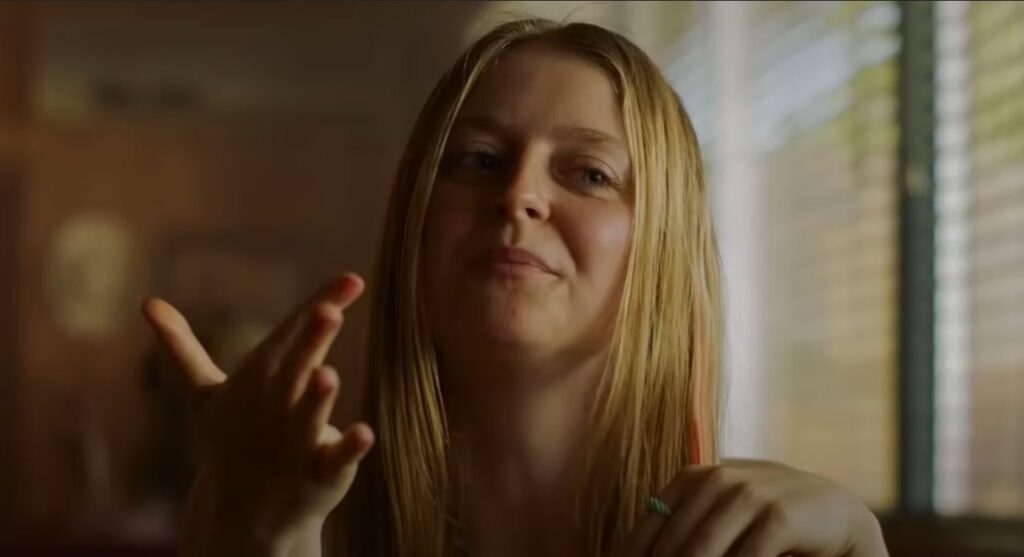
So, yeah, not exactly glamorous stuff. Aside from a few scattered and ominous visions of Ed Harris pointing a pistol at the camera as the screen is bathed in dark-red hues, Glass stages these establishing scenes with minimal embellishment, creating a mood of tawdry grimness. (This is further symbolized by the characters’ various hairstyles: a ghastly array of mullets, rattails, and overstretched plaits that suggest a vendetta against barbers.) Yet when Jackie, an aspiring bodybuilder from Oklahoma who has her sights set on a national competition in Las Vegas, strides into Lou’s gym and prowls through the stations, Glass’ more vibrant sensibility springs to life. The moment when Lou eyes Jackie pumping iron—biceps swelling, confidence oozing—is a glorious visual meet-cute, with a flaring chemistry that recalls Damage or Fatal Attraction. It announces that, as much as Love Lies Bleeding is a seedy crime picture, it is also a love story.
The romance that develops between Lou and Jackie is, from a certain perspective, less than novel. They’re two hot young people who find connection in part because they’re mutually overlooked and underestimated. It’s as simple as that, and the dialogue (Glass wrote the screenplay with Weronika Tofilska) doesn’t do much to individualize their partnership. Yet there’s still a welcome intensity to their desire, one that Glass amplifies through sweaty sex scenes and tangible lust. The actors make a fascinating pairing, as O’Brian’s rawness contrasts pointedly against Stewart’s nuance. The result is a relationship that, if not especially new, nonetheless feels spiky and alive.
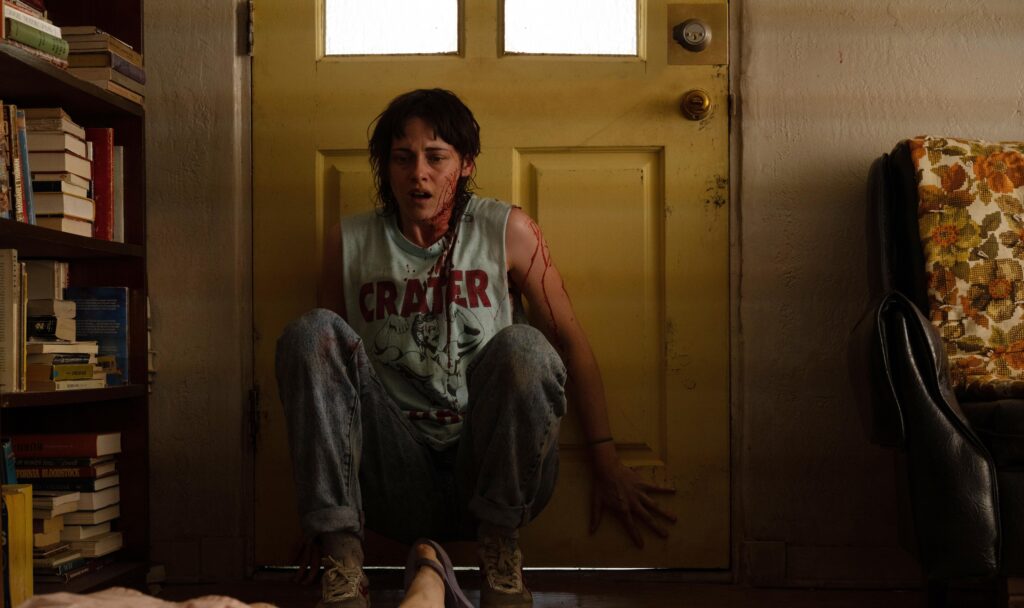
The strength of their bond is quickly and severely tested, as Glass tilts into genre mode and ramps the plot into overdrive. (One suspects that she set the film in 1989 primarily to avoid cell phones nullifying the logistical complications.) Bullets are fired, bodies are discovered, alliances are forged and broken, and long-slumbering demons awaken with a roar. What began as a modest chronicle of squalid souls becomes a feverish quest for redemption and survival.
There is a frisson of excitement to these sequences—it is always vicariously thrilling to watch someone try to roll up a cadaver inside a rug, a task Lou performs twice with curious facility—but they aren’t entirely persuasive. Certain scenes—as when Lou is being questioned by feds while fielding a phone call from a threatening third party, all while a fresh corpse drips blood behind her couch—are awkwardly edited, preventing them from acquiring the proper suspense. And a piece of backstory regarding the fate of her mother receives both too much attention and too little clarity.
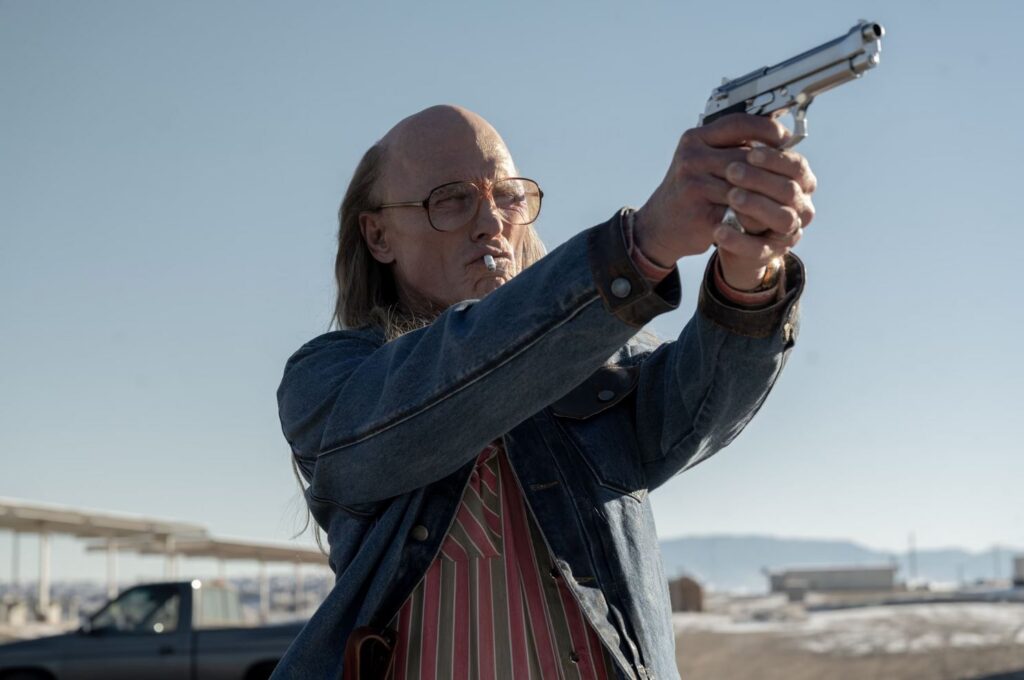
Yet if Glass hasn’t mastered the rhythms of noir storytelling, she continues to exhibit a formidable command of mood and tone. This is most evident in her treatment of Jackie’s body, which is at once a finely sculpted monument and a carnival of terror. Throughout the picture, Glass delivers jagged, phantasmagorical close-ups of her heroine’s flesh—veins popping, skin stretching, muscles rippling—as though it’s metamorphosing against her will. This leads to a brilliant sequence in Vegas, where Jackie’s dreams and nightmares coincide, and where Glass provides images that are both luminous and grotesque.
Glass seems to recognize that Love Lies Bleeding isn’t wholly credible as a crime thriller, which accounts for its ridiculous and magnificent ending. In its final scenes, the movie boldly relinquishes any claim to realism, instead pivoting to fantasy with a courage that lends it a marvelous purity. “Wow,” an entranced Lou says upon seeing Jackie truly flex her muscles for the first time. I don’t pretend to be familiar with Lou’s broader predicament, but in that moment, we were of the same mind.
Grade: B
Jeremy Beck is the editor-in-chief of MovieManifesto. He watches more movies and television than he probably should.
